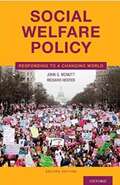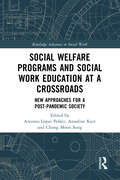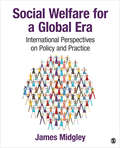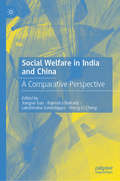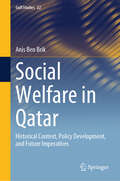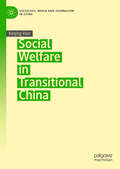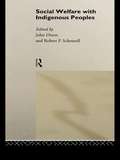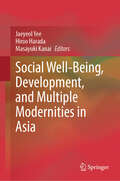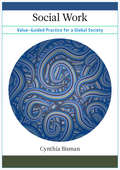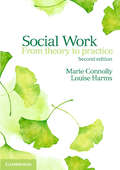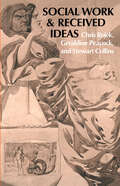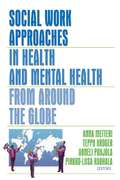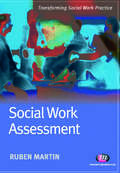- Table View
- List View
Social Welfare Policy: Responding To A Changing World
by Richard Hoefer John G. McNuttSocial Welfare Policy: Responding to a Changing World is a topical, comprehensive introduction to social welfare policy. It uses a contemporary framework that explicitly addresses three forces that have redefined the social policy arena: the growth of the information economy, the rise of globalization, and our current environmental crisis. This framework is applied to the six traditional arenas of policy--child and family services, health and mental health, poverty and inequality, housing and community development, crime and violence, and aging, and explores how to find solutions to both long enduring and brand new problems. John McNutt and Richard Hoefer's introductory text represents a move forward in social welfare policy thinking that is built on the latest scholarship and teaches students that the time to create social policies for the future is in the present.
Social Welfare Programs and Social Work Education at a Crossroads: New Approaches for a Post-Pandemic Society (ISSN)
by Antonio López Peláez Annaline Keet Chung Moon SungThis book explores a key phenomenon that has been accelerated by the COVID-19 crisis, namely, the crossroads at which social welfare professionals find themselves. This is a crossroads where, on the one hand, there is an accelerated digitalization process and a reorganization of social programs, while on the other hand, we are confronted by the basic challenge of designing social policies and their methods of evaluation, that is, the generation of robust data that will allow better evaluation of social projects and programs.Rigorously analyzing the crossroads at which social welfare programs find themselves and the new demands for the education of professionals involved in social welfare programs, several key issues can be discerned;• the theoretical debate surrounding the changes brought about by the COVID-19 pandemic and the process of redefining globalization in which we are immersed.• the challenges to be met by welfare programs, and the good practices that are being implemented.• the key issue of how to generate more robust data in the field of social services and social protection.• how to increase the competencies of professionals through education in schools of social work.Providing 15 newly written chapters drawn from both the global north and the global south, it offers a set of recommendations to address the challenges of inequality and social inclusion in the coming years.It will be of interest to all academics, students and practitioners working in the fields of social work, social welfare and social development.
Social Welfare Services For Israel's Arab Population
by Aziz HaidarIn the mid-1980s, over 40 percent of Arab households fell below the poverty line. In this book, Dr. Haidar, a Palestinian living in Israel, presents the results of extensive fieldwork in Arab and Jewish localities on the social conditions and welfare service needs of Arab children, youth, and elderly in Israel.
Social Welfare for a Global Era: International Perspectives on Policy and Practice
by James O. MidgleyWritten by internationally renowned author and scholar James Midgley, Social Welfare for a Global Era provides a comprehensive framework for examining social welfare from a global perspective. Drawing on a large body of literature and his own extensive knowledge of the field, Dr. Midgley offers students, scholars, and practitioners an up-to-date account of the complex ways social well-being is enhanced in the global era, including the major welfare institutions that provide a cultural context for social welfare policy and practice.
Social Welfare for a Global Era: International Perspectives on Policy and Practice
by James O. MidgleyWritten by internationally renowned author and scholar James Midgley, Social Welfare for a Global Era provides a comprehensive framework for examining social welfare from a global perspective. Drawing on a large body of literature and his own extensive knowledge of the field, Dr. Midgley offers students, scholars, and practitioners an up-to-date account of the complex ways social well-being is enhanced in the global era, including the major welfare institutions that provide a cultural context for social welfare policy and practice.
Social Welfare in East Asia and the Pacific
by Sharlene B. C. L. FurutoIn this singular collection, indigenous experts describe the social welfare systems of fifteen East Asian and Pacific Island nations and locales. Vastly understudied, these lands offer key insight into the successes and failures of Western and native approaches to social work, suggesting new directions for practice and research in both local and global contexts. Combining international experiences and professional knowledge, contributors illuminate the role of history and culture in shaping the social welfare systems of Cambodia, China, Hong Kong (SAR, China), Indonesia, Malaysia, the Micronesian region (including the Federated States of Micronesia, Guam [Unincorporated Territory, U. S. A. ], Marshall Islands, Northern Mariana Islands [Commonwealth, U. S. A. ], and Palau), Samoa and American Samoa (Unincorporated Territory, U. S. A. ), South Korea, Taiwan, and Thailand. The contributors link the values and issues that concern populaces most to the development of social work practice, policy, and research. Sharlene B. C. L. Furuto then conducts a comparative analysis of the essays including their data and social service programs, highlighting the similarities and differences between the evolution of social welfare in these nations and locales. She contrasts their indigenous approaches, the responses of governments and NGOs to social issues, the availability of social work education, as well as API models, paradigms, and templates, and the overall status of the social work profession. Furuto also adds a chapter comparing the distinct social welfare systems of Samoa and American Samoa. The only volume to focus exclusively on social welfare in East Asia and the Pacific, this anthology holds immense value for practitioners and researchers eager for global perspectives.
Social Welfare in East Asia and the Pacific
by Sharlene B. C. L. FurutoIn this singular collection, indigenous experts describe the social welfare systems of fifteen East Asian and Pacific Island nations and locales. Vastly understudied, these lands offer key insight into the successes and failures of Western and native approaches to social work, suggesting new directions for practice and research in both local and global contexts.Combining international experiences and professional knowledge, contributors illuminate the role of history and culture in shaping the social welfare systems of Cambodia, China, Hong Kong (SAR, China), Indonesia, Malaysia, the Micronesian region (including the Federated States of Micronesia, Guam [Unincorporated Territory, U.S.A.], Marshall Islands, Northern Mariana Islands [Commonwealth, U.S.A.], and Palau), Samoa and American Samoa (Unincorporated Territory, U.S.A.), South Korea, Taiwan, and Thailand. The contributors link the values and issues that concern populaces most to the development of social work practice, policy, and research. Sharlene B. C. L. Furuto then conducts a comparative analysis of the essays including their data and social service programs, highlighting the similarities and differences between the evolution of social welfare in these nations and locales. She contrasts their indigenous approaches, the responses of governments and NGOs to social issues, the availability of social work education, as well as API models, paradigms, and templates, and the overall status of the social work profession. Furuto also adds a chapter comparing the distinct social welfare systems of Samoa and American Samoa. The only volume to focus exclusively on social welfare in East Asia and the Pacific, this anthology holds immense value for practitioners and researchers eager for global perspectives.
Social Welfare in India and China: A Comparative Perspective
by Rajendra Baikady Jianguo Gao Lakshmana Govindappa Sheng-Li ChengFocusing on social work and social service delivery, this book examines the social policies and programmes designed to address different societal issues and concerns across India and China. It focuses on gaining understanding of design and delivery of social welfare policies related to special interest groups, highlighting important contemporary challenges such as child labour, child abuse, exploitation of women, problems related to disabled people, mental health issue, illiteracy and unemployment. Offering a comparative perspective, the book considers the impact of political administration in both countries to critically assess key issues related to social welfare in two different political, economic, social, and cultural contexts.
Social Welfare in Qatar: Historical Context, Policy Development, and Future Imperatives (Gulf Studies #22)
by Anis Ben BrikThis book offers an in-depth analysis of social welfare system in a rentier state, Qatar, tracing its evolution and institutional development. Through the innovative lens of 'modern traditionalism,' it examines how Qatar blends contemporary social policies with traditional cultural values across nine key sectors: public health, education, social security, social care, housing, disability, employment, family, and gender. The book's unique approach combines the Policy Arrangement Approach with Rentier State Theory and Historical Institutionalism to provide in-depth analyses of Qatar's social welfare policies. This interdisciplinary perspective offers fresh insights into the interplay between modernization, tradition, and social policy in a rentier state. Covering historical trajectories, current institutional arrangements, and future challenges, the book provides a holistic view of Qatar's social welfare system. It explores how the country navigates the tensions between rapid modernization and cultural preservation, offering valuable lessons for other countries. Intended for academics, policymakers, and students in public policy, Middle Eastern studies, social policy, and development studies, this book offers both theoretical depth and practical insights. It is an essential resource for understanding social welfare development in resource-rich states, offering valuable insights for both academic research and policy formulation in the Arab Gulf region and beyond.
Social Welfare in Transitional China (Sociology, Media and Journalism in China)
by Keqing HanAt a time of significant transformations in Chinese society, this book addresses the key issue of social welfare and the reform of the welfare system in 21st century China. Considering both the theory and policy making across a variety of welfare issues which directly impact on the country’s economic development, it examines the development of civil society, changes in social stratification and in social class structure. It notably considers the key questions of welfare in both urban and rural settings, for different population groups such as children, the elderly and the disabled, addressing topical issues of housing, education, public health, poverty and the restructuring of related welfare policy system to tackle China’s key issues. It also considers the impact of migrant workers in China and their social integration, including within the welfare system. Providing a unique insight into how economic globalization and financial crisis affects Chinese social welfare policies, this book is a key read for scholars worldwide interested in social transformation in Chinese society at a time of significant social and economic transition.
Social Welfare with Indigenous Peoples (Comparative Social Welfare Series)
by John Dixon Robert P. ScheurellIn many areas of the world, there has been an earlier indigenous population, which has been conquered by a more recent population group. In Social Welfare with Indigenous Peoples, the editors and contributors examine the treatment of many indigenous populations from five continental areas: Africa (Sierra Leone, Zimbabwe); Australasia, New Zealand; Central and South America (Brazil, Mexico); Europe (Scandinavia, Spain) and North America. They found that, regardless of whether the newer immigrants became the majority population, as in North America, or the minority population, such as in Africa, there were many similarities in how the indigenous peoples were treated and in their current situations. This treatment is examined from many perspectives: political subjugation; negligence; shifting focus of social policy; social and legal discrimination; provision of social services; and ethnic, cultural and political rejuvenation.
Social Welfare: A History of the American Response to Need
by Mark J. Stern June AxinnSeeing social work and social welfare through a historical lens This book is part of the Connecting Core Competencies Series. This series helps students understand and master CSWE’s core competencies with a variety of pedagogy highlighted competency content and critical thinking questions for the competencies throughout. Social Welfare: A History of the American Response to Need allows students to place current issues of social concern in their historical context. Numerous original documents help students understand the impact of history on current social welfare issues.The book examines the history of social work and social welfare in the United States since the 18th century. It shows how social conditions, ideas about dependency and poverty, and institutions have shaped social policy and the efforts of voluntary organizations and individuals who work with at-risk populations. Coverage of economic developments, the impact of volunteerism, and the impact of privatization in Social Welfare: A History of the American Response to Need helps students understand the context of social welfare movements and policies. By examining forces of social change and continuity, the text helps students see contemporary topics like health care reform, welfare, and homelessness through a historical framework.
Social Welfare: Scottish Perspective (Routledge Revivals)
by Mono ChakrabartiThis title was first published in 2001. This volume, adopting a Scottish perspective, concentrates on welfare issues in the UK. The book acknowledges the fact that the Scottish legislative base has, historically, been different from the rest of the country, and explores the impact of these differences upon the nature of welfare institutions and service provision. The contributors also critically investigate the important changes being implemented in Scotland within the disaggregated local authority structure, exposing the resource implications for service providers. The book tackles policy issues ranging from poverty and social security to health care, education and criminal justice. An analysis of the relevant laws is incorporated into every chapter, together with an investigation of the crucial implications of social and welfare policies for family structure, class and ethnicity.
Social Well-Being, Development, and Multiple Modernities in Asia
by Jaeyeol Yee Hiroo Harada Masayuki KanaiThis book presents an integrated international exploration of social well-being from a comparative standpoint: how it is framed, how it is perceived by the people, and how it is exploited by the state. It provides a genuine multicultural and multidimensional understanding of social well-being in an Asian context by showing the strength of comparative analysis. The idiosyncrasy of an individual society is reinterpreted through the universality of harmonized data analysis and imaginative discussion of the findings. The book offers the reader a deep understanding of how social well-being is framed in eight Asian countries, how it is contextualized in each society, and how it is correlated with the concept of development and sustainability. Articulated by carefully chosen examples, historical background, and interpretation of the latest data analysis, this book is highly recommended to readers who seek to understand the relationship among the well-being of individuals, national development, and global sustainability.
Social Work
by Cynthia BismanThis innovative textbook reconfigures generalist social work practice for the twenty-first century
Social Work
by Jan FookSocial Work: A Critical Turn is both an introduction to critical social work and an examination of current theory and practice. This volume features contributions from an international group of scholars who define the main theoretical underpinnings of a critical approach to social work and examine innovative practice methods using this approach. Social Work: A Critical Turn situates critical social work within a theoretical context, comparing it with postmodernist, radical, feminist, anti-racist and structural approaches. It also reviews key issues that require further development in critical social work theory, practice and research.
Social Work
by Jan FookSocial work is a human profession founded on social justice. It is difficult however to negotiate this in the constantly-changing context of the twenty first century. Now in its' second edition, this book considers the critical tradition of social work and updates it with postmodern thinking. Jan Fook draws on critical reflection to help social workers deliver flexible, responsible and responsive practice and to celebrate the ageless ideals of the profession. Key ideas covered in the text include: - Postmodernism - Critical theories - Critical reflection - Contextuality The author draws on her own experiences, to relate theoretical ideas to real life. Summaries, exercises and further reading are also included in each chapter. The book will be essential reading for all undergraduate students of social work. It will also be a valuable resource for postgraduate students and qualified professionals, who want to revisit the critical tradition of social work.
Social Work
by Marie Connolly Louise HarmsThis wide-ranging collection of essays offers valuable insights into the cultural issues involved in the practical application of social work theories. Leading contributors explore the challenges faced by indigenous populations and ethnic minority groups, examining how they can gain control over their position as minority populations, and offering valuable guidance on cross-cultural work. The direct implementation of four established theoretical approaches - ecological systems, community development, strengths-based approaches and attachment theories - is shown in a variety of contexts, including mental health care, trauma counselling and child protection. Using community development work in Australia and New Zealand as a case study, the contributors also advocate using these approaches in work with migrants and refugees. Social Work Theories in Action recognizes the importance of drawing on the strengths of families, individuals and communities and offers theoretical perspectives that can be applied in everyday work situations. It is essential reading for social and community workers, mental health professionals and social work students.
Social Work & Received Ideas
by Chris RojekFirst published in 1989. Routledge is an imprint of Taylor & Francis, an informa company.
Social Work & the Courts: A Casebook
by Daniel Pollack Toby G. KleinmamSocial Work and the Courts is a compendium of the most recent and important legal cases in social work and social welfare. Its dissection and analysis of crucial cases makes it an excellent tool for teaching social workers to understand the legal system and its operation. The book demonstrates how courts view and deal with the performance, action, and conduct of social workers and their agencies. This second edition includes more case studies, paying particular attention to recent cases on foster care and child welfare. In addition, a new section on "References and Further Readings" has been added to the end of each chapter along with an update bibliography and Internet bibliography so that readers may easily find supplementary information.
Social Work Approaches in Health and Mental Health from Around the Globe
by Pirkko-Liisa Rauhala Anna Metteri Teppo Kroger Anneli PohjolaOvercome the challenges facing social workers today with international guidance Social Work Approaches in Health and Mental Health from Around the Globe is a valuable stepping stone toward an understanding of the diversity of methods utilized in social work for community health services. This work stems from material gathered at the Third International Conference on Social Work in Health and Mental Health, held in Tampere, Finland. In this book, you will find new creative theoretical and practical orientations for designing, developing, and analyzing social work to help you produce policies and services in which clients can positively and productively invest.Social Work Approaches in Health and Mental Health from Around the Globe covers a long period in the history of social work in health issues, from theoretical treatises to empirical research and analyses of practices. The book provides you with research, case studies, and existing international and national literature from India, Botswana, Taiwan, Lithuania, the United Kingdom, Australia, and the United States. This resource explores the shared qualities of social work in health services throughout the world despite differences between countries in terms of culture, social system, and history. Although these experts come from different parts of the world, the book displays an emergence of similar issues and themes, including: the development of expertise for social workers in the health and mental health fields social work as an agent of change that crosses borders, operates on many levels, and across many dimensions of society community-based care-principles, perspectives, marginalized groups, and the role of the social worker dual divisions-becoming aware of and choosing a position in work practice
Social Work Approaches to Conflict Resolution: Making Fighting Obsolete
by B Harold Chetkow-YanoovSocial Work Approaches to Conflict Resolution helps readers understand the nature and causes of conflict and offers suggestions for coping with conflict effectively. It is based on two assumptions: that conflict is a basic part of the life of normal human beings, groups, organizations, communities, and nations, and that resolving conflict is part of the ongoing interventions of all social workers. A practical text for theory-practicum courses for MSW and doctoral students, it is filled with information also useful to therapists, group workers, community workers, administrators, scholars in the social sciences, practitioners in other helping professions, and trainers in the emerging field of conflict resolution itself. Deliberately linking conflict resolution and systems analysis, Social Work Approaches to Conflict Resolution tackles a number of related themes to help you see the connections between topics not normally presented together in social work literature. You’ll see how unmet needs may cause conflict to evolve and escalate and learn about the connections between strongly held feelings and the destructive relations that have developed between diverse ethnic peoples in many parts of our planet. Author Benyamin Chetkow-Yanoov draws on his own background of being a minority as well as his experience in Arab-Jewish reconciliation in Israel as he offers readers thorough explanations of: a systems model for analyzing conflict problem-solving versus resolving conflict how value clashes and victimization are some of the basic causes of conflict escalation 9 professional roles required for resolving conflicts the effectiveness of volunteers in conflict resolution teaching conflict resolution skills to various audiences trends in the evolution of voluntary conflict resolution effortsYou can apply much of what you learn in Social Work Approaches to Conflict Resolution not only to your professional life but also to your personal relationships and experiences. Also, since victimized people and groups are major contributors to the perpetuation and escalation of conflict, the book suggests 10 steps for helping victims free themselves from repeated conflict-generating behaviors.
Social Work Assessment (Transforming Social Work Practice Series)
by Ruben MartinAt a time of change and review within social care, it is relevant to explore traditional skills, knowledge and values associated with assessment in the context of changing practice. This book introduces and explores assessment in social work in a user-friendly, yet comprehensive way. The author reviews the interpersonal skills necessary for social work practice, applying them particularly to assessment and outlines fundamental knowledge and theoretical models that can inform assessment. The professional social work value base underpinning assessment and the power balance between assessor and the person being assessed are also taken into consideration.
Social Work Case Management
by Roberta R. Greene Betsy S. VourlekisThis new practice text provides a series of readings focusing on case management in a number of fields and in a variety of settings with different client populations. Each chapter examines a major component of case management practice by presenting information about an innovative program from a different location around the country. In conjunction, these readings provide a road map to social work case management.In addition to offering up-to-date practice approaches and examining the functions and skills of case management in depth, the authors provide the policy information needed for putting this traditional form of social work practice into today's service delivery context.
Social Work Case Management: Case Studies From the Frontlines
by Michael J. HoloskoWritten by a social worker for social workers! This innovative book equips readers with the knowledge and skills they need to be effective case management practitioners in a variety of health and human service organizations. A must-read for students and professionals in social work, this important work introduces a unique Task-Centered Case Management Model built around the unifying principles of the profession—person-in-environment, strengths-based work, and ecological perspective. Over twenty case studies by case managers and professionals offer innovative practice insights, illustrating the practice roles and responsibilities of today′s case managers and the realities of conducting case management in today’s growing, exciting, and challenging field.
